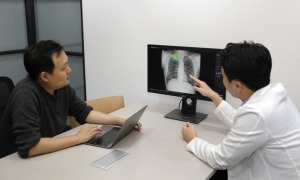by
Lauren Dubinsky, Senior Reporter | January 03, 2018

Early research showed 14 percent
increase in diagnostic accuracy
A new deep learning-based technology for evaluating diagnostic images is currently under testing at major medical institutions in Korea.
Early clinical trial results have shown that the Lunit INSIGHT data-driven imaging biomarker (DIB) technology increases diagnostic accuracy by 14 percent.
Lunit Inc. is now expanding on that research with Seoul National University Hospital, Severance Hospital of Yonsei University Health System, Samsung Medical Center and Asan Medical Center.
Lunit INSIGHT was created by a medical team and consists of 12 researchers that specialize in deep learning and three physicians. Lunit unveiled it at last year's RSNA meeting in Chicago.
The technology analyzes existing X-ray images to detect signs of major lung diseases including lung cancer, pneumonia, pneumonthorax and tuberculosis. Results can be generated a few seconds after the images are uploaded.
"Currently, DIB technology has achieved an accuracy level comparable to that of human experts," Anthony Paek, CEO of Lunit, said in a statement. "In the future, however, we will have new DIB technologies capable of outperforming humans."
Lunit INSIGHT is not the only technology of its kind.
Research presented at RSNA 2017 found that Tranpara's new deep learning CAD system can perform as well as experienced radiologists.
GE Healthcare also announced at the annual meeting that
it plans to integrate MedyMatch Technology's artificial intelligence platform with its CT systems.
Lunit expects the technology to be used for clinical purposes in hospitals and medical centers by the second half of this year.
The company also has plans to unveil a mammography solution in the first half of next year that will enable physicians to use Lunit INSIGHT to diagnose early-stage breast cancer.
